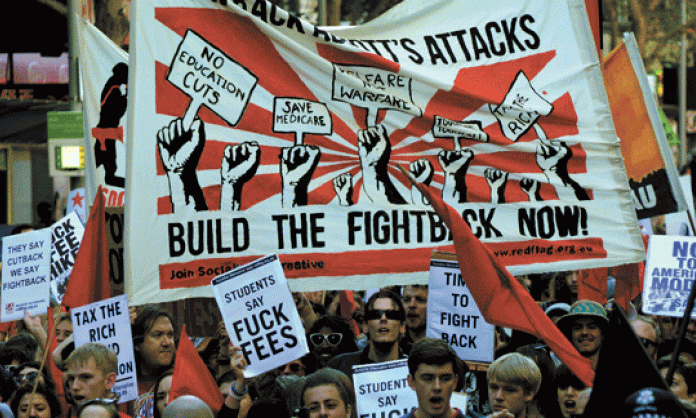The sweeping Liberal offensive announced in the May budget poses sharply the need to rebuild a left that takes as its starting point the need for unrelenting resistance to attacks on the working class, and a commitment to the fight for a fundamentally different society.
The long retreat of the left since the 1970s has been not just numerical and organisational, but ideological as well.
The Labor Party, which once contained within it radicals who believed it could be a vehicle for radical transformation and a new socialist order, is now for the most part indistinguishable from the Liberal Party.
Labor radicals once railed against the media, the public servant chiefs, the police, the prison system and the judiciary. They are now thoroughly integrated into the establishment and have close ties with the boardrooms and the clubs of the rich – where the real decisions about our society get made.
So blatant is this interconnection that Bill Shorten had no qualms about attending the wedding of former union head Paul Howes to Qantas boss Olivier Wirth, which was attended by an array of Murdoch hacks, Liberal politicians and other low-lifes.
But the problem is not just the Labor Party. Since the decline of the Communist Party and the broader radical left in and around the unions, those who have rightly recoiled from Labor’s adaption to the right have themselves abandoned many of the key elements of what once made up the left.
In particular, they have abandoned the idea that the workers’ movement is the crucial element in any fightback against the right or challenge to capitalism. This has manifested most strikingly in the rise of the Greens, who, while challenging Labor on a range of social issues like refugees and marriage equality, have no meaningful orientation to the labour movement. Their policies are often pro-union enough – but the disdain of many Greens politicians for workers is revealed by disgraceful decisions like the one to back the restoration of petrol tax indexing.
The Communist Party and other left currents in Australian history championed strikes, organised unions and intervened in them to fight for a class struggle approach. Individual Greens members might be union members and even activists, but as a party, it is completely detached from the union movement.
This approach reflects a trend on the broader liberal left and on the university campuses, which views social conflict simply as an ideological battle between liberalism (or broadly defined social-democracy at best) and conservatism.
The Abbott/Hockey budget exposes the inadequacy of the approach of those in both the Greens and Labor orbits. It is a declaration of class war which demands a response from our side that is equally intransigent. We need to build a new left that rejects the shabby game of official politics, with its polite, dinner party-style debate epitomised by so-called “political discussion” programs like the ABC’s Q&A.
We need a left that can start to articulate a vision for a completely different society; a society in which the wealth currently controlled by the mining bosses, industrialists and bankers is shared and democratically controlled by all.
Centuries of collective labour have created the possibility of a society in which every person could discover their full potential. And yet despite all the riches of the modern world, the horizons of political and social debate are ever narrowing.
If this is what we get when the economy is going well, then that is argument enough that there is no saving this system. We need to build a movement that will fight for a fundamentally different society.









